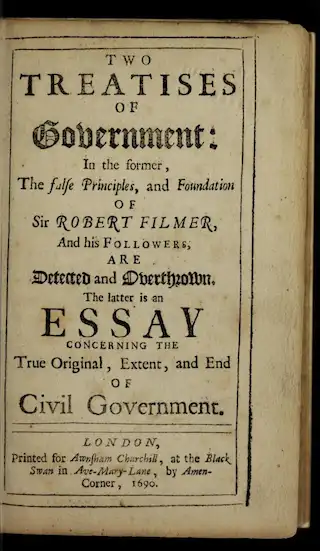Ch 4: Glorious revolutions?
John Locke
Two Treatises of Government (1690)
Perhaps Locke’s best-known writing, this work was a response to Sir Robert Filmer’s Patriarcha. It attacked the very basis of defenses of absolutist monarchies. Written in exile, Locke would eventually publish the work once the Glorious Revolution ushered in an era of more tolerance for views such as Locke’s.
Introduction
John Locke’s Two Treatises of Government is today his best-known work, though during the eighteenth century, after his death, he became most widely known as the author of An Essay Concerning Human Understanding, a text that helped to shape the Enlightenment. In the eighteenth century, the Two Treatises of Government, with its radical suggestions about governance, was considered by many in power to be too extreme. Over the past three centuries, it has had a substantial influence on politicians, statesmen, philosophers, historians, & political theorists, among others, both during the era of revolutions in the late eighteenth and early nineteenth centuries and again after WWII, when it became touted as a handbook for democracy.
As the United Nations’ power spread in the wake of WWII, so did Locke’s influence. Since WWII, the Two Treatises have been translated into innumerable languages. Most modern theories about justice in a democracy, such as libertarian Robert Nozick’s, or the more egalitarian John Rawls’ Theory of Justice, have built upon the basis laid out by Locke in these volumes. Michael Sandel’s “communitarian” critique of Locke’s supposed individualism starts with these volumes. Amartya Sen’s critique of Western theories of justice—and his attempt to show how such ideas appeared in some forms in other cultural traditions, such as those of India, looked for principles comparable to Locke’s core principles.
Of the two treatises, the second is the more well-known and easily divorced from context. The ideas presented in both works examine the formation of society and civil government. But whereas the second treatise can be read as theoretical, the first is a more direct rebuttal to Sir Robert Filmer’s Patriarcha, which had seen a resurgence in popularity after its publication in 1680.
As Charles II’s regime stepped up their efforts to amass power and curb dissent and speech, his ministers and officials touted Filmer’s theories that justified the king’s powers. Locke was one of many Whigs, such as Algernon Sidney and Tyrell, who took issue with Charles II’s and James II’s arbitrary and capricious use of power. Locke had begun drafting the treatises before 1683, like his friend Sydney, while still residing in England. But seeing the brutal persecution of his patron, Lord Shaftesbury, in 1682, and the many accusations surrounding the supposed Rye House Plot early in 1683, Locke fled to the Netherlands “for his health.”
During his time in exile, he revised both treatises. He revised them more after the Glorious Revolution in early 1689, using them explicitly to justify that revolution, as is clear from his introduction. Scholars debate how much of these were written at that point. Locke claimed there was a third treatise that had gone missing. Even after the Glorious Revolution, with new monarchs on the crown whom Locke knew, he was still afraid: he published the treatises anonymously.
Questions to Consider:
- What points does Locke make in these excerpts? How do they correspond to other works in this collection you have read already?
- What issues does Locke take with Filmer’s work? How does he rebuke Filmer’s ideas on the divine right of kings?
- Locke’s second treatise has been often cited as justifying slavery, yet read closely the text of this section and consider it in relation to Locke’s experiences as the secretary for the Lords Proprietors of Carolina and the Council for Trade and Plantations. Thinking back on Locke’s experiences during Charles II’s reign, how did those influence his arguments about power? About just governance? About liberties? About slavery?
Holly Brewer
Lauren Michalak
Further Reading
- Ashcraft, Richard. Revolutionary Politics and Locke’s Two Treatises of Government. Princeton, N.J.: Princeton University Press, 1986.
- Brewer, Holly. “Slavery, Sovereignty, and ‘Inheritable Blood’: Reconsidering John Locke and the Origins of American Slavery.” American Historical Review 122, no. 4 (2017): 1038-78.
- Goldie, Mark. “John Locke and Anglican Royalism.” Political Studies 31, no. 1 (1983): 61-85.
- Goldie, Mark. “John Locke’s circle and James II.” The Historical Journal 35, no. 3 (1992): 557-586.
- Waldron, Jeremy. God, Locke, and Equality: Christian Foundations of John Locke’s Political Thought. New York: Cambridge University Press, 2002.
Sources
- John Locke, Two Treatises of Government: In the former, The false Principles, and Foundation OF Sir Robert Filmer, and his Followers are Detected and Overthrown. The latter is an Essay Concerning the True Original, Extent, and End of Civil Government (London, Awnsham Churchill, 1690). Excerpts from 1690 printing. These excerpts represent the sections from both treatises that deal most with themes of liberty, slavery, and the nature of just power.
Cite this page
Download
Content Warning
Please be aware that many of the works in this project contain racist and offensive language and descriptions of punishment and enslavement that may be difficult to read. However, this language and these descriptions reveal the horrors of slavery. Please take care when transcribing these materials, and see our Ethics Statement and About page.

John Locke's First Treatise of Government
The false principles and foundation of Sir Robert Filmer and his followers are detected and overthrown.

John Locke's Second Treatise of Government
An essay concerning the true original extent and end of civil government.